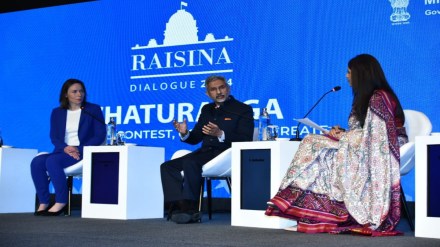The world should “look at India’s methods to solve issues,” suggests External Affairs Minister S Jaishankar. Speaking at the Raisina Dialogue in New Delhi, the minister advocated for changes in global organizations like the United Nations. Jaishankar highlighted that the UN, created nearly eighty years ago with around 50 members, now has “four times as many members.” He argued that such growth necessitates reforms. He observed that in the past five years, significant global issues have remained unresolved due to the “lack of multilateral solutions.”
During the session titled ‘A Tapestry of Truths: Can the Two Hemispheres Agree?’, Jaishankar, alongside delegates like Dutch Foreign Affairs Minister Hanke Bruins Slot and Tanzania Minister of Foreign Affairs January Makamba, stressed the need for radical UN reforms. He cautioned against manipulating global rules for individual gains, emphasizing the current trend of countries pursuing their own solutions due to a deadlock in international cooperation.
Responding to queries about India’s role in shaping a reformed global order, Jaishankar highlighted India’s contributions and its potential to serve as a model for resolving global challenges. He mentioned India’s impartiality in addressing issues like Covid-19 and regional conflicts. Jaishankar expressed India’s aspiration to be a global leader by fostering relationships worldwide.
“The world can learn from India’s examples to solve problems,” said Jaishankar, underlining India’s willingness to contribute positively to global affairs. He stressed the importance of being proactive in addressing pressing issues, urging for collective action and cooperation among nations.
“The lack of results demonstrates the lack of reforms,” Jaishankar remarked, emphasizing the urgent need for restructuring global institutions to address contemporary challenges effectively. He reiterated India’s commitment to supporting initiatives aimed at promoting peace, stability, and development worldwide.
The Raisina Dialogue, inaugurated by Prime Minister Narendra Modi, is a three-day event focusing on geopolitics and geo-strategy, organized by the Ministry of External Affairs in partnership with the Observer Research Foundation. This year marks the ninth edition of the Dialogue, continuing until February 23.
Delivering his Vote of Thanks on Wednesday evening, the minister emphasized the potential of the India-Greece partnership to act as a stabilizing force.
Jaishankar remarked, “Throughout history, connectivity has wielded immense influence. Therefore, it is only natural that the discussions between the Prime Ministers today revolved around bolstering ties between two prominent global economic hubs, India and Europe. The IMEC (India-Middle East-Europe Economic) Corridor, as highlighted by Prime Minister Kyriakos Mitsotakis of Greece, holds particular significance in this context.”
Prime Minister Narendra Modi inaugurated the ninth edition of the Raisina Dialogue, where the Prime Minister of Greece, Kyriakos Mitsotakis, chaired the inaugural session as the Chief Guest.
“As India expands its presence overseas, Greece emerges as an attractive destination. Our pharmaceutical sector, agro-industry, and aviation sector have already established a foothold there,” Jaishankar pointed out.
He underscored the Prime Minister’s remarks regarding the increasing Greek investment and interest in India. “We anticipate that a mobility agreement will further strengthen our ties. Raisina is conducive to fostering business relationships,” remarked Jaishankar.
